|
|
|
Sort Order |
|
|
|
Items / Page
|
|
|
|
|
|
|
| Srl | Item |
| 1 |
ID:
096499
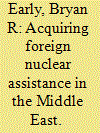

|
|
|
|
|
| Publication |
2010.
|
| Summary/Abstract |
The United Arab Emirates (UAE) has laid out an ambitious plan to become the first Arab country to possess a civilian nuclear energy program. Central to that effort has been the Emirati government's ability to obtain foreign nuclear assistance. This article traces the UAE's strategies for overcoming the obstacles that stood in the way of nuclear suppliers providing assistance. It examines the approach taken by the UAE to assuage the safety and security concerns of nuclear suppliers, how the UAE leveraged its alliances with France and the United States to obtain their cooperation, and its strategies for engaging domestic interest groups in supplier states. The generalizable elements of the UAE's strategies are discussed and used to provide insight into the prospects for other Middle Eastern states' bids to obtain similar assistance. The article concludes with a discussion of the potentially transformative aspects of the strategies employed by the UAE in shaping other countries' pursuit of nuclear energy in the region.
|
|
|
|
|
|
|
|
|
|
|
|
|
|
|
|
| 2 |
ID:
151836
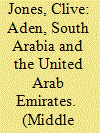

|
|
|
|
|
| Summary/Abstract |
Five decades after withdrawing its troops from Aden for the last time, the decision by the Government of Harold Wilson to abandon the Federation of South Arabia (FSA) and with it, the various tribal potentates that had aligned themselves with this project in state creation continues to generate vociferous debate. For some, any attempt to configure a modern state from a largely tribal field was doomed to fail as internecine conflict; regional rivalries punctured the illusion of a unified Federal identity, let alone a coherent state. For others, it was a lack of British political resolve as well as investment of the necessary treasure that forced the issue and saw London abandon erstwhile allies to an often bloody fate with the emergence of a Marxist-led regime in what became South Yemen after 1967. Yet just three years later, Britain oversaw the creation of the United Arab Emirates (UAE) from a collection of tribal entities, a state creation project that continues to endure. In a series of articles written by leading historians of the region as well as former diplomats, this issue of Middle Eastern Studies sets out to compare and contrast the circumstances and context surrounding the failure of the FSA with the establishment of the UAE, the legacy of which continues to shape the politics and security of the Gulf region in the twenty first century.
|
|
|
|
|
|
|
|
|
|
|
|
|
|
|
|
| 3 |
ID:
068958
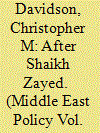

|
|
|
| 4 |
ID:
164399
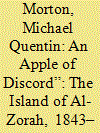

|
|
|
|
|
| Summary/Abstract |
Based on an extensive study of archival records, this article shows how a series of episodes in the history of the Trucial Coast — today’s United Arab Emirates (UAE) — helped to shape the direction of the area’s history. At face value, the island of al-Zorah appeared to have little to offer, but it nevertheless figured in the ambitions of the Wahhābīs, local rulers and the British, all of whom coveted it for one reason or another; the outcome of their struggles helped to set the seal on the future configuration of the UAE. While the article provides a valuable insight into Great Britain’s role in the area, it also reveals regional rivalries and inter-tribal tensions that still exist in the region today. However, the coming together of the UAE and Saudi Arabia, and their need to show solidarity in the face of current challenges, have obscured the historical differences that the story of al-Zorah represents.
|
|
|
|
|
|
|
|
|
|
|
|
|
|
|
|
| 5 |
ID:
151845
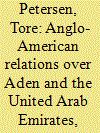

|
|
|
|
|
| Summary/Abstract |
The British decision to withdraw from Aden in 1967 was a political decision made because of Labour's distaste for imperialism and empire. As Aden descended into chaos and disorder, the Americans watched with equanimity; accepting an increased Soviet and Chinese presence in the Federation after British withdrawal. Later, the Nixon administration supported British attempts to federate tiny Arabian sheikhdoms on the tip of the Arabian Peninsula into the United Arab Emirates (UAE). The main American concern was for Britain to hand over the Tunbs and Musa Islands to the Shah of Iran whom Nixon had anointed American shieldbearer in the Gulf. This the British willingly did in order to secure access to the lucrative Iranian market, while at the same time the Heath government succeeded in creating the UAE.
|
|
|
|
|
|
|
|
|
|
|
|
|
|
|
|
| 6 |
ID:
112960
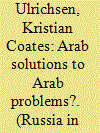

|
|
|
|
|
| Publication |
2012.
|
| Summary/Abstract |
By virtue of its very small local population and its extremely high level of oil and gas resources, Qatar simply does not face the socio-economic or political pressures coursing through the region. Uniquely, it has embraced the Arab uprisings as an opportunity, rather than a challenge, to cement its international (Western) reputation, albeit at the expense of some of its regional relationships.
|
|
|
|
|
|
|
|
|
|
|
|
|
|
|
|
| 7 |
ID:
115071
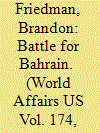

|
|
|
|
|
| Publication |
2012.
|
| Summary/Abstract |
After the popular uprisings that struck in Tunisia, Egypt, Libya, Bahrain, Yemen, and Syria, the surviving Middle East monarchies have come under heavy criticism in the West. Many believe it is only a matter of time until they are next. The conventional wisdom in the West is that this revolutionary change in the Middle East must be a positive thing. Popular demands for political freedom are viewed as part of the inevitable march of progress. Another implicit assumption in the West is that the monarchies, like the corrupt autocrats who have fallen, lack popular support.
|
|
|
|
|
|
|
|
|
|
|
|
|
|
|
|
| 8 |
ID:
144288
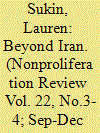

|
|
|
|
|
| Summary/Abstract |
Several states in the Middle East have noted their interest in nuclear energy programs, but current cost and timeline estimates understate the difficulties that these states will face. A state-level analysis of nuclear development capacities in Saudi Arabia, Egypt, Jordan, Turkey, and the United Arab Emirates suggests that building nuclear infrastructure in the region will, in fact, be a lengthy and expensive endeavor, due to concerns such as export constraints, public opposition, a lack of human resources, and high overhead costs. This has implications for nuclear weapon nonproliferation: first, fears that these developing nuclear energy capabilities may facilitate possible weapon proliferation are premature, and second, there is time to ensure that any burgeoning nuclear infrastructure in the region remains safe and civilian in nature.
|
|
|
|
|
|
|
|
|
|
|
|
|
|
|
|
| 9 |
ID:
086790
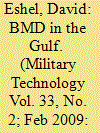

|
|
|
|
|
| Publication |
2009.
|
| Summary/Abstract |
One needs only glance at a map to see that Saudi Arabia and the small Gulf Emirates would have a great deal to fear from a nuclear-armed Iran seeking to extend its influence beyond its borders. The open identification of these states with a perceived Sunni Arab interest in the region might be expected to further exacerbate fear of Iran and a desire to counter its ambitions. Fear of Iran certainly does exist in these countries.
|
|
|
|
|
|
|
|
|
|
|
|
|
|
|
|
| 10 |
ID:
123888
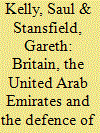

|
|
|
|
|
| Publication |
2013.
|
| Summary/Abstract |
This article investigates the deepening of the UK's security and defence arrangements with the United Arab Emirates (UAE).
In recent years there has been a flurry of diplomatic activity indicating far closer engagement between London and Abu Dhabi. Rather than being an innovative initiative of the Cameron government, the interaction has deeper roots, with this article uncovering the importance of the relatively unknown Defence Cooperation Agreement (DCA) of 1996, signed by the Major government. Furthermore, the UK-UAE defence relationship is shown to have endured beyond the infamous UK withdrawal from 'east of Suez' in 1971.
The current engagement is, however, more intense and potentially far-reaching than it had been in recent decades, with the defence sector being placed at the forefront of UK efforts to bolster the relationship with the oil-rich Gulf emirate.
Using official statements from London and Abu Dhabi, this article suggests that the UK-UAE relationship has always remained intact, although it lost focus following the end of the Major government until the refocusing on the Gulf by the Cameron government. The article concludes with an assessment of the expectations of the UAE, and the strategic drivers underpinning UK policy.
|
|
|
|
|
|
|
|
|
|
|
|
|
|
|
|
| 11 |
ID:
184348
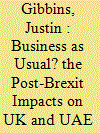

|
|
|
|
|
| Summary/Abstract |
Since the formal leaving of the United Kingdom from the European Union on January 31, 2020, much discussion has focused on the consequences for British foreign policy. Predictions broadly fit into two outcomes: internationalism, echoed in the “global Britain” mantra, and isolationism, with a Britain struggling to be heard on the world stage. As British foreign and trade policies are being shaped by a desire to seek out new friends, and reaffirm contacts with old ones, the United Arab Emirates, a Gulf Cooperation Council country with a palpable set of linkages to the UK, will be impacted. Military, diplomatic and economic ties are robust, but the UAE’s position, particularly in light of its rising-power regional status, requires investigation. With some believing British influence will be stymied by its non-EU status, and with a UAE that has reversed its traditional nonintervention status to become more regionally resurgent, what would this mean for future UK–UAE relations? This article seeks to provide an early snapshot of the post-Brexit relationship between the two.
|
|
|
|
|
|
|
|
|
|
|
|
|
|
|
|
| 12 |
ID:
180355
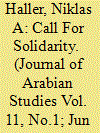

|
|
|
|
|
| Summary/Abstract |
While the contemporary political and economic ties between the Gulf region and the Levant are widely acknowledged, the deeper historical roots of this modern relationship are rarely recognized in light of persistent narratives of the Gulf’s relative isolation before the discovery of its hydrocarbon wealth. Building on a study of the British archival record, this article contributes to a challenge of such narratives by examining one of the earliest instances in which mutual ties became manifest: the political and financial support for the Arabs of Palestine by the population of the Trucial States (the contemporary United Arab Emirates) in the interwar years. As is shown, the development of pro-Palestinian sentiment was enabled not only by an earlier expansion of education in the Trucial States, but also by rapidly developing communication links between the Gulf and the wider Arab world. As a result of these developments, the population of the Trucial States was subject to –– and proved receptive to –– calls for Arab and Muslim solidarity emanating from Palestine in the late 1930s.
|
|
|
|
|
|
|
|
|
|
|
|
|
|
|
|
| 13 |
ID:
177689
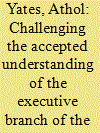

|
|
|
|
|
| Summary/Abstract |
The accepted understanding of what constitutes executive government in the United Arab Emirates (UAE) is that power rests with the Cabinet. This is, however, only partially correct. In reality, executive power over national security is excised from the Cabinet, and instead rests with a group of legislatively-defined agencies and posts. In other words, institutionally the UAE’s executive branch is bifurcated, with one part handling ‘high’ policy, meaning national security, and the other ‘low’ policy, that is all the rest. This article describes the unobserved part of the UAE’s executive branch. In doing so, it provides a significant advance in the understanding of the somewhat opaque nature of government in the UAE. Importantly, it provides a more nuanced understanding of the sources of power as they relate to the powerful Sheikh Mohammed bin Zayed Al Nahyan, a person often (mis)characterised as the de facto leader of the UAE.
|
|
|
|
|
|
|
|
|
|
|
|
|
|
|
|
| 14 |
ID:
172442
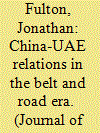

|
|
|
|
|
| Summary/Abstract |
In the summer of 2018 China and the United Arab Emirates (UAE) upgraded their bilateral relationship to a comprehensive strategic partnership, China’s highest level of diplomatic relations. This follows a trajectory of deepening multifaceted ties that has been steadily becoming strategically important for both states, especially as China’s Belt and Road Initiative (BRI), launched in 2013, results in deeper engagement in the Middle East. This article examines the features of the China-UAE relationship, providing an original historical framework that explains the context of relations through four periods prior to the BRI: indifference, hostility, transition, and interdependence. It then analyzes developments in the bilateral relationship during the early stages of the BRI, demonstrating that the UAE has become a key partner for China in its Middle East policy.
|
|
|
|
|
|
|
|
|
|
|
|
|
|
|
|
| 15 |
ID:
101824


|
|
|
|
|
| Publication |
2011.
|
| Summary/Abstract |
Some consider the Emirate of Dubai, within the United Arab Emirates (UAE), a modern Eldorado and blueprint for development. Others question its governance, sustainability and labour practices. Sober judgement of the alternate Dubai narratives stumbles on definitional ambiguities, urban perspective intractability and empirical uncertainty. Definitions of governance and sustainability are particularly contested and presumptions of a universal city blueprint are considered alchemy. Nevertheless, a metaphorical Eldorado is a useful starting point for structured discussion. Acknowledging complexity and data limitations, the paper sketches some likely constituents of a modern Eldorado and then compares it with conditions in the oriental former boomtown. Tentative preliminary indications suggest that Dubai, as many other cities, is overbuilt and unhealthy. Notwithstanding some phantasmagorical projects and scattered architectural icons, disease manifests itself in governance concerns, economic volatility, urban sprawl and social fragmentation. Vectors for disease are excessive regional oil liquidity, constitutional constraints, a narrow commercial focus and institutional limitations. The result: impressive growth is driven by factor accumulation and undermined by overcrowding and pollution. Reforms to the current quasi-feudal modus operandi challenge powerful vested interests in the mercantile Emirate but the global financial crisis could herald beneficial reform.
|
|
|
|
|
|
|
|
|
|
|
|
|
|
|
|
| 16 |
ID:
177116
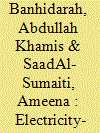

|
|
|
|
|
| Summary/Abstract |
Electricity and water consumption play a crucial role in the sustainable development of desert regions. In countries with arid climates like the United Arab Emirates (UAE), water-energy efficiency and conservation in agriculture are critical issues. This paper investigates the characteristics of and interlinkages between electricity and water consumption on UAE farms to suggest policies for water-energy efficiency and conservation. Descriptive statistics and multivariate regression analysis were performed on data collected from surveys of farm owners and rural water tanker services. Unlike urban areas, these rural statistics show that water use is more important than electricity use, and that the cost and reliability of water are more important than the cost and reliability of electricity. Multivariate regression analysis identified interlinkages among five common factors that influence both electricity and water consumption: farmer age, worker salary, visiting times of owner's family, number of buildings, and number of rooms. Importantly, worker salary is the key influence on both water and electricity consumption. These results suggest that sustainable rural policies should consider the key factors of “workers' salary” and “water cost” for increasing both water-energy efficiency and conservation.
|
|
|
|
|
|
|
|
|
|
|
|
|
|
|
|
| 17 |
ID:
143407
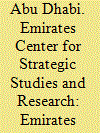

|
|
|
|
|
| Publication |
Abu Dhabi, ECSSR, 1999.
|
| Description |
301p.hbk
|
|
|
|
|
|
|
|
|
|
|
|
Copies: C:1/I:0,R:1,Q:0
Circulation
| Accession# | Call# | Current Location | Status | Policy | Location |
| 042446 | 030.95357/ABU 042446 | Main | On Shelf | Reference books | |
|
|
|
|
| 18 |
ID:
076482
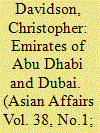

|
|
|
| 19 |
ID:
151844
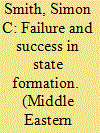

|
|
|
|
|
| Summary/Abstract |
Despite the apparent similarities in Britain's relationship with the Sheikhdoms of the Lower Gulf and the traditional states of southern Arabia, British policy-makers pursued contrasting policies towards the two sets of territories in the era of decolonization. As regards South Arabia, Britain followed a policy of amalgamating the states into a ‘Whitehall’ federation. The fact that the Federation of South Arabia remained dependent on British backing, and in consequence became ineffably associated with British imperialism in an era of anti-colonial Arab nationalism, fatally damaged its chances of longevity. Applying the lessons of failure in South Arabia, the British were far more inconspicuous in the discussions which led to the creation of the United Arab Emirates (UAE). Indeed, the fact that the UAE essentially emerged from the initiative of Sheikhs Zaid of Abu Dhabi and Rashid of Dubai, rather than the British, was one of the key factors in its survival. By contrast, the Federation of South Arabia collapsed ignominiously once the ballast provided by the British had been removed.
|
|
|
|
|
|
|
|
|
|
|
|
|
|
|
|
| 20 |
ID:
161476
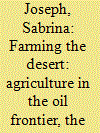

|
|
|
|
|
| Summary/Abstract |
This article examines the social and political factors that contributed to the development of agriculture in the United Arab Emirates (UAE) from the 1940s onwards, expanding upon Jason Moore’s concept of the ‘commodity frontier’. Beginning in the mid-twentieth century, agricultural production emerged as a ‘secondary commodity frontier’ propelled by the primary commodity in the region—oil. The example of the UAE illustrates how the dynamics inherent in the primary commodity frontier can generate ‘secondary frontiers’. Furthermore, commodity frontiers are not necessarily exclusively motivated by market forces, as emphasized by Jason Moore. Indeed, the spread of agriculture in the UAE was not primarily tied to the export of any particular crop. Rather, the newly formed state after 1971, like colonial forces prior to this period, promoted agriculture in part to improve local people’s standard of living. Modern agriculture, furthermore, transformed local power structures and facilitated the country’s transition from a traditional to a modern state and its integration into a global capitalist economy.
|
|
|
|
|
|
|
|
|
|
|
|
|
|
|
|
|
|
|
|
|